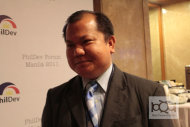This 'balikbayan' hopes to lure fellow Filipino scientists back from abroad
loQal – 15 June 2011
By KC Santos
MANILA CITY, METRO MANILA – One of the major reasons Filipino scientists are going abroad instead of working in the country is the lack of incentives, according to a scientist from the University of the Philippines (UP).
Dr. Raul Destura, facilitator of the Institute of Molecular Biology and Biotechnology, National Institute of Health at UP Manila, also cited the lack of “reasonable compensation” as another reason why Filipino scientists choose to work abroad.
Destura said he is hoping to lure back Filipino scientists abroad through his own work on diagnostic technologies. He was a former infectious disease specialist in Virginia and worked as head of the Study Group on Enteric Diseases.
“I came back to the Philippines because I wanted to do something about the shortage of researchers here.
Regardless of the income I was getting abroad, I left those behind and took a chance here, because I firmly believe that someday things are going to change,” Destura said.
The Institute of Molecular Biology and Biotechnology was started only three years ago but Destura said the facility continues to look for grants locally and abroad.
“It's difficult for a researcher to manage research in the country because of very problematic procurement processes within the university especially transactions related to equipment and all those things necessary for them to run their science,” he said, adding that scientists often become frustrated “when economic reality kicks in”.
Commonly discussed and debated in national forums is the funding for the treatment of illnesses. For Destura, government and investment funding must be equalized if not, channeled to pre-emptive health measures like diagnostic technologies and disease prevention.
While waiting for more grants, Destura said the institute is targeting to develop a total of 21 innovations for use in health research and development. They are currently on the last stage of Project One, which involves a device that cuts the days for diagnosis of dengue from a week to only 2 days from the onset of fever.
“The Biotek M Project Dengue involves the use of a device with which nucleic acid amplification technology is applied. You simply plug it into an AC port or a car battery which then emanates heat. On the device you simple mix a solution with the extracted blood sample and the change in color will tell you if you do or do not have dengue,” Destura said.
He added that in other countries it takes five to seven years to create this kind of diagnostic technology, but Filipino scientists did it in nine months.
Destura added that they are just waiting for the approval of the funding from the Department of Science and Technology (DoST) for the final clinical trial stage before the diagnostic tool is finally mass produced.
“These technologies are low-lying meaning these are easily achievable in a very short time-frame. If only there are people in the Philippines who can actually give the funding because now, the only way I could keep them from leaving is giving them the salary they deserve for their time and effort,” Destura said.
Destura said present and future projects are vital for the innovation of research and development in the country. All that is needed is for Filipino scientists to come back home and willingly fulfill their obligation to their fellowmen.
“There is something brewing here in the Philippines and I wish you all to be part of that history by coming back. As scientists, we should feel that it is our obligation to come home and help in any way we can, our country,” he said.


No comments:
Post a Comment